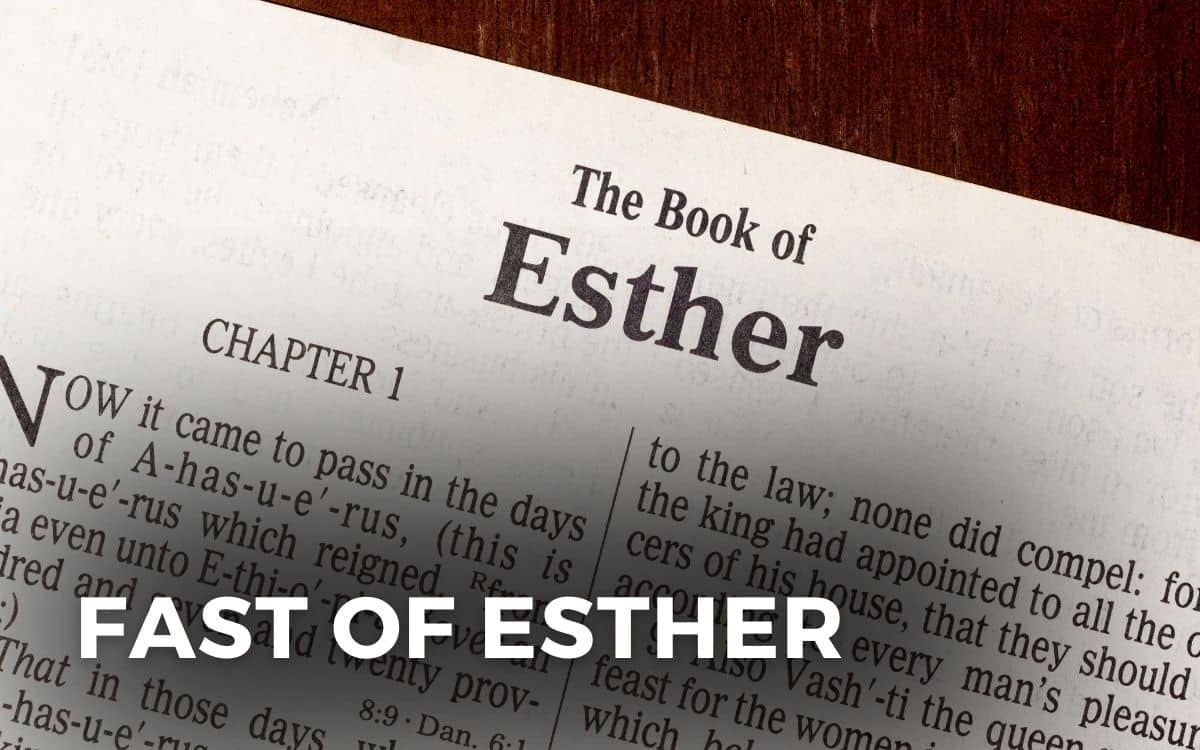In 2024, the Fast of Esther is observed on Wednesday, March 20th. As you reflect on the historical and religious significance of various holidays, the Fast of Esther emerges as a day shrouded in mystery and tradition. This observance, marked by fasting and prayer, holds a deeper meaning that resonates with many. You may find yourself intrigued by the ways in which this day can foster unity and spiritual rejuvenation in your workplace. Stay tuned to discover how incorporating the Fast of Esther into your business culture can create a sense of community and shared purpose that transcends the ordinary.

Disclosure: This post contains affiliate links. If you make a purchase using one of these links, I may receive a small commission. Please know that I only recommend products I have used and that I sincerely think will help your business.
When is Fast of Esther?
On the 13th day of Adar in the Jewish calendar, the Fast of Esther is traditionally observed, commencing at dawn and concluding at nightfall with restrictions on eating and drinking. This fasting tradition is a time of spiritual reflection, where individuals engage in prayer and contemplation, preparing themselves for the upcoming joyous holiday of Purim. The historical origins of this fast date back to the events recounted in the Book of Esther, where Queen Esther called for a fast among the Jewish people in Shushan before she approached King Ahasuerus to plead for the salvation of her people.
The Fast of Esther holds significant cultural importance within the Jewish community, serving as a solemn reminder of the challenges faced by the Jewish people in the past and the power of faith and courage in overcoming adversity. It is a day marked by introspection, repentance, and seeking divine intervention. As you observe this fast, you join in a tradition that has been passed down through generations, connecting you to the rich tapestry of Jewish history and heritage.
In addition to the spiritual aspects, there are specific preparation rituals associated with the Fast of Esther, such as refraining from certain activities and focusing on acts of kindness and charity. By adhering to these customs, you not only honor the tradition but also deepen your own spiritual experience during this sacred time.
History of Fast of Esther
The Fast of Esther, known as Ta’anit Esther in Hebrew, is a significant holiday in the Jewish tradition commemorating the fast observed by Queen Esther and the Jewish community of Persia before she approached King Xerxes to plead for the salvation of her people.
This event is central to the story of Purim, a festival celebrated on the 14th day of the Hebrew month of Adar, which marks the deliverance of the Jewish people from a genocide plotted by Haman, the royal vizier of Persia. The Fast of Esther is observed on the day preceding Purim, with participants fasting from dawn until nightfall.
The origins of the Fast of Esther can be traced back to the Book of Esther, also known as the Megillah, which is read aloud in synagogues during Purim festivities. According to Jewish tradition, Queen Esther, with the support of her cousin Mordecai, risked her life by entering the king’s presence uninvited to intercede on behalf of her people. She requested that the Jews of Persia fast for three days before she approached the king, seeking divine guidance and strength.
The Fast of Esther serves as a solemn occasion for reflection, repentance, and spiritual preparation leading up to Purim. It symbolizes the unity, courage, and faith displayed by Queen Esther and the Jewish people in the face of adversity. Today, the Fast of Esther continues to be observed by Jewish communities worldwide as a time for prayer, introspection, and acts of charity. It underscores the enduring legacy of Esther’s bravery and the timeless values of justice, compassion, and perseverance.
How to Celebrate Fast of Esther
To honor the Fast of Esther, you can fast from dawn to dusk, reflecting on Esther’s bravery. Engage in prayers, rituals, and readings to deepen your connection to this solemn occasion. Remember to give to charity and seek guidance from a rabbi for meaningful observances.
How Individuals Can Celebrate Fast of Esther
As you prepare to observe the Fast of Esther, consider embracing the solemnity of the day through acts of devotion and charity. Engage in prayerful reflections on Queen Esther’s bravery and the triumph of good over evil. Seek guidance from spiritual leaders to guarantee your observance aligns with the traditions and values of this sacred fast.
- Fasting: Abstain from food and drink from sunrise to sunset, following the tradition of Queen Esther’s fast before approaching King Ahasuerus.
- Prayer and Meditation: Spend time in prayer, reflection, and meditation, seeking spiritual growth and connection with the Divine.
- Reading the Book of Esther: Read or listen to the Book of Esther (Megillat Esther) to understand the story behind Purim and the significance of the Fast of Esther.
- Acts of Kindness: Practice acts of charity and kindness, such as giving to those in need or performing mitzvot (good deeds) to help others.
- Attending Synagogue Services: Attend synagogue services where the Book of Esther is read aloud in the evening, joining with the community in prayer and observance.
How Businesses Can Celebrate Fast of Esther
As a business owner, you can honor the Fast of Esther by accommodating employees who observe this solemn day. Create a supportive environment by offering designated spaces for prayer and moments of reflection. Consider providing fasting-friendly meal options and demonstrating respect for different religious practices to foster an inclusive workplace culture.
- Community Fast: Organize a community-wide fast, bringing together friends, family, and neighbors to observe the Fast of Esther collectively, fostering a sense of unity and solidarity.
- Megillah Reading: Attend or host a Megillah reading event at a local synagogue or community center, where the story of Esther is recounted aloud, followed by discussions on its significance and relevance today.
- Charitable Acts: Use the day to engage in acts of charity and kindness, such as donating to organizations that support vulnerable communities or volunteering at a local soup kitchen or food bank.
- Educational Workshops: Arrange educational workshops or lectures focusing on topics related to the Fast of Esther, such as Jewish history, traditions, and the importance of fasting and prayer.
- Personal Reflection: Set aside time for personal reflection and prayer, contemplating the lessons of courage, faith, and resilience exemplified by Queen Esther and the Jewish people during challenging times.
Social Media Post Ideas for Fast of Esther
As you prepare to observe the Fast of Esther, consider sharing meaningful social media posts that resonate with the essence of this solemn day. Craft messages that highlight the significance of Queen Esther’s bravery, the power of prayer, and the importance of standing up against oppression. Encourage your followers to engage in acts of charity and reflection, spreading awareness of this special occasion in a digital age.
Social Media Post Ideas for Individuals to Use on Fast of Esther
As you prepare to observe the Fast of Esther, consider how you can utilize social media to share the spiritual significance of this day with others. Craft posts that educate your audience about the historical context of Queen Esther’s fast and its relevance today. Engage in meaningful conversations by sharing traditional practices, insights, and guidance related to the Fast of Esther.
- Share Inspirational Quotes: Post quotes from the Book of Esther or other relevant sources that inspire faith, courage, and perseverance, encouraging reflection and contemplation among followers.
- Raise Awareness: Use social media to raise awareness about the significance of the Fast of Esther and its historical context, sharing informative posts, articles, or videos to educate others about the holiday.
- Encourage Reflection: Create engaging prompts or questions related to the themes of the Fast of Esther, inviting followers to share their thoughts, prayers, or personal reflections on the holiday.
- Promote Community Events: Spread the word about local Megillah readings, fasting gatherings, or charitable initiatives happening in your area, encouraging participation and community involvement.
- Share Acts of Kindness: Document and share acts of kindness or charitable deeds performed during the Fast of Esther, inspiring others to engage in similar acts of compassion and generosity.
Social Media Post Ideas for Businesses to Use on Fast of Esther
As a business looking to honor the Fast of Esther, consider utilizing social media to share the spiritual significance of this day with your audience. Engage your followers by highlighting traditional customs like charity giving and encouraging acts of kindness. By sharing historical insights and promoting community involvement, you can create meaningful content that resonates with your audience on this important fast day.
- Educational Posts: Share informative content about the history, traditions, and significance of the Fast of Esther, providing followers with insights into the holiday’s cultural and religious importance.
- Promote Special Offers: Offer discounts or promotions on products or services related to the Fast of Esther, such as traditional foods, religious items, or charitable donations, to engage customers and drive sales.
- Encourage Community Engagement: Facilitate discussions and interactions among followers by posing questions, hosting polls, or sharing user-generated content related to the Fast of Esther, fostering a sense of community and connection.
- Support Charitable Causes: Use social media to raise awareness and support for charitable initiatives or organizations that align with the values of the Fast of Esther, encouraging followers to contribute or get involved in acts of kindness and charity.
- Share Inspirational Messages: Post uplifting messages, quotes, or prayers related to the themes of the Fast of Esther, offering words of encouragement, hope, and solidarity to your audience during this significant religious observance.
Want to create social media content 10X faster? Start your free 7-day trial of the Social Media Content Club and say goodbye to social media stress.
Hashtags to Use During Fast of Esther
During the Fast of Esther, it is customary to use hashtags that resonate with the significance of this observance. By incorporating hashtags like #FastingTradition and #HalfShekelCharity, you can connect with others participating in this solemn fast. These hashtags serve as digital markers of shared traditions and spiritual reflections during this period.
- #FastOfEsther
- #Purim
- #Esther
- #JewishTradition
- #Fasting
- #ReligiousObservance
- #FaithAndFasting
- #EstherFast
- #JewishHeritage
- #SpiritualReflections
For the complete bullet list of holidays to celebrate on social media in March, visit AngieGensler.com/March-Holidays,
Gift Ideas for Fast of Esther
As you prepare to observe the Fast of Esther, ponder on meaningful gift ideas that reflect the essence of this holy day. Consider offering charity in the form of a half-shekel, a traditional and spiritually significant gift. Donating to those in need or supporting charitable causes can be a beautiful way to commemorate this fast.
- Books on Jewish History: Explore the rich heritage and stories of the Jewish people, providing insightful reading material for reflection during the Fast of Esther.
- Prayer Books and Siddurim: Enhance spiritual practice with prayer books or siddurim, enabling individuals to engage in meaningful prayer and reflection throughout the day.
- Journal and Pen Set: Encourage self-reflection and introspection with a journal and pen set, allowing individuals to jot down thoughts, prayers, and reflections during the fast.
- Tea and Herbal Infusions: Offer soothing tea blends and herbal infusions to help individuals stay hydrated and comforted during the fast while enjoying aromatic flavors.
- Essential Oil Diffuser: Create a calming atmosphere with an essential oil diffuser, providing a serene environment for meditation and contemplation during the Fast of Esther.
Other Holidays Related to Fast of Esther
As you explore the theme of ‘Other Holidays Related to Fast of Esther,’ you will uncover a rich tapestry of celebrations intertwined with this solemn day. These holidays include Purim, a joyous occasion following the Fast of Esther, marking the deliverance of the Jewish people. The connection between these holidays symbolizes the shift from introspection to jubilation, highlighting the depth of the Jewish calendar’s spiritual significance.
- Purim: Purim is celebrated the day after the Fast of Esther and commemorates the deliverance of the Jewish people from a plot to annihilate them.
- Yom Kippur: Known as the Day of Atonement, Yom Kippur is another significant fasting day in Judaism, focusing on repentance and forgiveness.
- Tisha B’Av: Tisha B’Av is a day of mourning that commemorates various tragedies in Jewish history, including the destruction of the First and Second Temples in Jerusalem.
- Shavuot: Shavuot marks the giving of the Torah at Mount Sinai and is celebrated with special prayers, studying of Torah, and festive meals.
- Yom HaShoah: Yom HaShoah, also known as Holocaust Remembrance Day, honors the six million Jews who perished in the Holocaust, with ceremonies and memorial services held worldwide.
For more holidays, download our free calendar with over 1,000 fun and unique holidays to celebrate this year. Head to angiegensler.com/holiday-calendar to grab your free copy
Future Dates for Fast of Esther
To prepare for the upcoming observances of the Fast of Esther, consider consulting a Hebrew calendar for the future dates of this significant day. Remember that the Fast of Esther typically occurs on the 13th day of the month of Adar, shifting if it coincides with Shabbat. By staying mindful of these dates, you can honor the spiritual significance of this fast in anticipation of the joyful celebration of Purim.
| Year | Month | Day |
|---|---|---|
| 2024 | March 20 | Tuesday |
| 2025 | March 10 | Sunday |
| 2026 | March 1 | Friday |
| 2027 | March 19 | Monday |
| 2028 | March 7 | Sunday |
| 2029 | March 26 | Monday |
Frequently Asked Questions
As you seek to deepen your understanding of the Fast of Esther, it is essential to address common queries that may arise. These frequently asked questions provide clarity and insight into this sacred observance, guiding you on your spiritual journey with reverence and knowledge. Explore the following FAQs to enrich your comprehension of the Fast of Esther.
What is the significance of Fast of Esther?
The Fast of Esther commemorates the fast observed by Queen Esther and the Jewish people before she approached King Xerxes to save them from Haman’s evil plot. It symbolizes solidarity, repentance, and spiritual preparation before Purim.
How is Fast of Esther observed?
Observance typically involves abstaining from food and drink from dawn until dusk, similar to other Jewish fasts. Additionally, many engage in prayers, reflection, and reading the Book of Esther during this time.
Why is Fast of Esther observed before Purim?
The Fast of Esther precedes Purim as it symbolizes the fasting and prayer undertaken by Queen Esther and the Jewish community before the miraculous salvation recounted in the Book of Esther. It serves as a spiritual preparation for the joyous celebration of Purim.
Conclusion
In conclusion, the Fast of Esther stands as a profound testament to the courage and faith of Queen Esther and the Jewish people in the face of adversity. Through fasting, prayer, and reflection, this observance commemorates their unwavering resolve and the divine intervention that led to their deliverance. As we honor this tradition, let us also reflect on the timeless lessons of courage, resilience, and unity it imparts. Whether through fasting, charitable acts, or studying the story of Esther, may we find inspiration to stand against injustice and oppression in our own lives. Let us embrace this opportunity to deepen our understanding of the Fast of Esther and its significance in Jewish history, fostering greater empathy and solidarity with those facing challenges today.
Celebrate this special day with us, and don’t forget to download our free holiday calendar for more fun and unique holidays to celebrate this year.















